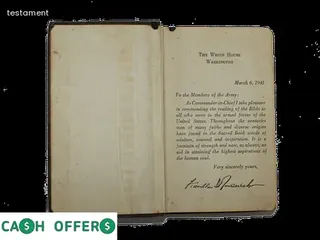Probate is a legal process that occurs after someone passes away. During probate, the deceased’s estate is managed and their assets are distributed according to their will or state law.
In Wisconsin, the court oversees probate proceedings and administers the distribution of an estate's assets. When navigating the probate process in Wisconsin for real estate strategies, it is important to know when it may be unnecessary.
Probates may not be necessary if all of the deceased’s assets are held through joint tenancy or if they have established a living trust instead of a will. Additionally, in some cases small estates may qualify to avoid probate altogether.
It is important to consult with an attorney who specializes in wills and trusts to determine when probate can be avoided and what steps need to be taken in order to do so.

Navigating the probate process in Wisconsin can be a complex and time-consuming endeavor. However, with proper planning it is possible to avoid probate altogether.
There are several strategies that can be employed to keep real estate out of probate in Wisconsin. One of the most common is adding a trust or joint tenancy to your title document.
A trust enables you to transfer ownership of the property after your death without going through the court system; instead, your designated beneficiaries will acquire ownership rights automatically upon your passing. Joint tenancy also allows for automatic transfers of ownership after death, but only if all tenants agree and survive until the transfer date.
Additionally, gifting real estate during life is another way to avoid probate in Wisconsin; however, be aware that taxes may apply and there could be other legal implications involved. In conclusion, understanding how to effectively manage your real estate holdings can go a long way towards avoiding probate in Wisconsin and ensuring that your wishes are carried out according to plan.
When a loved one passes on, often the executor of their estate will have the responsibility to navigate the probate process in Wisconsin. This can be an overwhelming task, but it is important to understand that executors may be eligible for compensation in certain situations.
The amount they are able to receive depends on factors such as location, amount of work done, and any applicable fees. In order to qualify for compensation, executors must provide evidence of services rendered and must complete all necessary paperwork.
Additionally, they must follow any instructions laid out in the deceased's will or trust document. When seeking out compensation, it is important for executors to take into account relevant laws and regulations in Wisconsin as well as those pertaining to real estate.
Understanding these legal components is key when determining if an executor can receive financial remuneration for their efforts.

In Wisconsin, the executor of a will is entitled to a reasonable payment for their service. The amount of this payment is determined based on the complexity of the estate and the time involved.
The probate court may set an executor's fee or allow it to be paid by the estate. Generally speaking, executors are not allowed to pay themselves until all debts and taxes are paid, so understanding how these payments work is important for anyone navigating the probate process in Wisconsin.
Taking into account any applicable statutes and limitations, an experienced attorney can help determine if an executor's payment is appropriate under Wisconsin law. It is also important to understand that these fees are subject to taxation, which must be taken into consideration when settling accounts and distributing assets from an estate.
Navigating the probate process in Wisconsin can be a long and complicated endeavor, especially when it involves real estate. The length of the probate process depends on several factors, including whether there is a will, how many heirs are involved, and the complexity of the estate.
In general, estates that are simple with minimal assets and no disputes among heirs may take a few months to complete the probate process. However, more complex estates may take years to settle fully.
If an estate includes real estate, there are additional steps such as appraising the property and determining its value for tax purposes that must be taken into consideration. Additionally, if one or more heirs live out of state, obtaining signatures from them can prolong the process significantly.
It’s important to understand that probate proceedings in Wisconsin typically require court supervision which adds additional time to the length of probate administration. Utilizing experienced legal counsel in navigating this lengthy process can help ensure that all deadlines are met properly while providing peace of mind to executors and heirs alike.

In Wisconsin, probate is the legal process that takes place after a person dies in order to transfer their assets and liabilities according to their will. All estates must go through this process in order to settle the deceased's affairs.
Depending on the size of the estate, probate can be a tedious and complex undertaking. Before beginning the process, it is important to understand which assets are subject to probate and which ones are not.
Generally speaking, real estate and tangible personal property are governed by probate laws while intangible assets such as stocks, bonds or bank accounts may not require it. Additionally, any assets that are held jointly or as a beneficiary on an account do not need to be passed through probate court.
It is also important to note that certain types of trusts can avoid probate entirely or limit its duration significantly. Having a thorough understanding of how the process works in Wisconsin can help ensure an efficient transition of all assets.
When navigating the probate process in Wisconsin, it is important to understand how will requirements are implemented in order to successfully transfer real estate from one individual to another. In the state of Wisconsin, a will must be signed by the testator, or person making the will, as well as two witnesses and should be notarized.
The will must also include language that clearly states that the testator is of sound mind and body, and a full inventory of all assets owned by the testator should also be included. The will should also provide detailed instructions for transferring ownership of real estate and other assets to beneficiaries selected by the testator.
Furthermore, any changes made to an existing will must also follow these same requirements and should be notarized accordingly. It is important to note that if a valid will cannot be provided during probate proceedings, then Wisconsin’s intestacy laws would apply in order to establish inheritance rights for survivors.

In Wisconsin, the time limit for filing probate after death is four months from the date of death. This process begins when a Petition for Probate is filed in the county where the deceased owned property.
The Petition must name an executor who will be responsible for handling the estate. It typically takes several weeks to receive a court appointment, during which time the executor has authority to make decisions on behalf of the estate.
During this period, it’s important to take stock of any real estate assets and determine whether they should be sold or transferred out of probate if possible. This can help avoid costs associated with going through probate court and can help speed up the process.
It’s also important to consult with an attorney well-versed in probate law for guidance in navigating this complex area of law.
The steps for settling an estate in Wisconsin can be complex and overwhelming, but understanding the probate process is key to successfully navigating it. The first step is to determine if the estate qualifies for informal probate, which requires the appointment of a personal representative and filing of a Petition for Informal Probate.
The Petition must include an inventory of all assets and liabilities as well as a list of heirs and beneficiaries. Once approved by the court, the personal representative will be responsible for notifying creditors and collecting any debts or assets due to the estate.
After creditor claims are settled, the remaining assets can be distributed according to Wisconsin law or any applicable will or trust instrument. Real estate assets must go through a separate process, which includes setting up an escrow account, transferring title documents, obtaining approval from lenders if needed, and ultimately closing on the real estate sale.
Following these steps helps ensure that all necessary legal requirements are met so that the deceased’s wishes can be carried out according to their last wishes.

In Wisconsin, the probate court system is part of the circuit court system and is responsible for settling estate matters. The probate process begins with filing a petition to open an estate in the county where the deceased resided.
After this, the court will appoint an executor or administrator to manage the estate. This individual is responsible for identifying and collecting assets, paying debts and taxes, and distributing remaining assets according to state laws or the terms of a will, if one exists.
In some cases, it may be necessary to obtain an appraisal of real estate owned by the decedent or petition for sale of real property. During this time, creditors must be notified and their claims considered prior to distribution of final assets.
The court maintains control of all proceedings until it issues an order closing the estate. It is important to work with experienced legal counsel throughout this process in order to ensure that all requirements are met and that real estate strategies are implemented correctly.
Navigating the laws surrounding probate code in Wisconsin can be a challenging and emotionally taxing endeavor. Those who are responsible for settling an estate must familiarize themselves with the complex rules and regulations that govern probate law in order to ensure that the process is handled correctly.
It is important to understand which documents are necessary, what forms of real estate may be included in the estate, how taxes are assessed, and any other applicable laws. While the state sets certain requirements for probate proceedings in Wisconsin, each county may have its own unique set of guidelines that must be taken into consideration while handling these matters.
An experienced attorney can provide valuable assistance when navigating the legal intricacies of the probate process. By understanding the relevant laws and properly preparing all necessary documents, those involved can help make sure that all parties involved receive their due compensation under Wisconsin's probate code.

Living Trusts and Probate Estates are both options for asset management, but each has its own advantages and disadvantages. Living Trusts provide an efficient way to transfer assets without the need for court involvement, allowing for a quicker and more private process than probate.
Additionally, living trusts enable one to avoid the costs associated with probating an estate. Alternatively, Probate Estates are subject to court supervision and require that all assets be inventoried, appraised and distributed according to the wishes of the deceased individual as expressed in their will.
However, since this process requires court oversight, it can also provide additional protection against challenges or fraud regarding asset ownership or distribution. In short, it's important to consider both Living Trusts and Probate Estates when making decisions about navigating the probate process in Wisconsin.
Personal representatives play a critical role in the probate process in Wisconsin, and it is important to understand the duties and responsibilities associated with this position. This includes filing documents with the court, providing notice to creditors and beneficiaries, collecting estate assets, paying debts and taxes, and distributing remaining assets as directed by the will or by law.
In some cases, personal representatives may also be charged with managing real estate owned by the deceased. This can include collecting rent payments, making repairs or improvements on properties, or hiring a real estate agent to facilitate a sale.
It is essential that personal representatives familiarize themselves with applicable real estate laws in Wisconsin to ensure compliance with all legal requirements throughout the probate process. Additionally, personal representatives should consider utilizing strategies such as funding trusts or transferring property prior to death as ways of minimizing probate costs and complications for beneficiaries.

Navigating the probate process in Wisconsin can be a daunting task for families, but there are certain real estate strategies that can help save time, money, and hassle. One of the most important steps to take is to look into how a living trust might benefit your family’s estate.
A living trust allows assets to be transferred without having to go through probate court; this will help ensure that your family’s wishes are met without any lengthy or costly delays. Furthermore, it’s often beneficial to consult with an experienced attorney who specializes in probate law in order to make sure all of your legal documents are up-to-date and properly executed.
Additionally, if you decide to sell any real estate during the probate process, it’s wise to work with a qualified real estate agent who is familiar with the local market; they may be able to get you a better sale price than if you try to handle the transaction yourself. Finally, tax considerations should also be taken into account when navigating the probate process in Wisconsin; it’s essential that families understand their potential tax liabilities and how best to minimize them so as not to leave a financial burden on their heirs.
By utilizing these strategies, families can navigate the probate process more efficiently and effectively and work towards achieving their desired outcome.
Navigating the probate process in Wisconsin is a complex undertaking when dealing with real estate. Wisconsin law requires that the executor or personal representative of the deceased’s estate must identify and inventory all assets, including any real property owned by the decedent.
It is then up to the executor or personal representative to determine if any real estate must be sold in order to settle debts and/or taxes, or whether it should be held for distribution among heirs. If real estate needs to be sold, Wisconisn probate law requires that it be done at fair market value as determined by a qualified appraiser.
In addition, the sale of any real property must also be approved by the court before it can proceed. While determining how real estate factors into an estate’s probate process can be daunting, there are strategies that can help make it easier.
Doing research on current local market values, consulting with knowledgeable advisors, and being familiar with specific laws regarding real estate sales in Wisconsin can all help streamline the process.

Navigating the probate process in Wisconsin can be a daunting task, and understanding the different types of wills and their uses is an essential part of the process. A will is a legal document that allows an individual to determine how their property and assets should be distributed after their death.
Intestate succession laws in Wisconsin are intended to ensure that when someone dies without a valid will, their property and assets are distributed according to state regulations. During the estate settlement process, creditors must be paid according to state regulations before any money or property can be passed on to heirs.
Property transfer after a death generally requires filing for title with the appropriate government agency. There are several strategies you can employ to minimize taxes on inherited assets such as taking advantage of federal exemptions, using trusts, or transferring certain assets into qualified retirement accounts.
Taking time to understand these concepts and working with experienced professionals can help simplify the probate process in Wisconsin.
Yes, it is possible to sell a house in probate in Wisconsin. The probate process can be complicated and requires navigating through complex laws and regulations.
To ensure that the sale of a house in probate is successful, there are strategies that must be implemented to make sure all requirements are met and the sale is completed successfully. In Wisconsin, understanding the probate process is essential when selling real estate during this time.
It is important to know who is responsible for handling the sale of a property in probate, as well as the various legal steps required for a smooth transaction. Working with an experienced attorney can help guide sellers through the rules and regulations associated with selling real estate in probate in Wisconsin.
Additionally, having an experienced real estate agent on your side can help navigate any potential issues or problems that could arise throughout the process. With proper planning and preparation, it is possible to sell a house in probate in Wisconsin and gain peace of mind knowing that everything was done properly and efficiently.

One way to avoid probate of an estate in Wisconsin is to create a trust. A trust allows you to transfer ownership and control of assets, such as real estate, to another person or entity.
By transferring assets into a trust, they are not included in the probate process and the estate can be divided more quickly and efficiently. In addition, creating a trust often reduces inheritance taxes as well as court costs associated with probating an estate.
Additionally, you can designate beneficiaries on certain accounts such as life insurance policies or retirement accounts that will allow these funds to be passed directly to these designated people without going through probate. Finally, it may also be possible for family members or other beneficiaries to enter into agreements between themselves for the division of assets outside of court.
These agreements can help streamline the process and avoid costly legal fees associated with going through the probate process in Wisconsin.
Navigating the probate process in Wisconsin can be a difficult and challenging process, especially when it comes to real estate strategies. Many people are not aware that they may need an attorney to properly settle an estate in Wisconsin.
An attorney can help you understand the legal aspects of the probate process and provide assistance with the filing of necessary documents, as well as advise on how to manage real estate transactions during this time. In addition to providing advice, an attorney can also handle any disputes that may arise throughout the procedure.
Additionally, having an experienced attorney on your side ensures that you will have someone to represent your interests and protect your rights during this important period. By engaging an experienced attorney to assist with settling an estate in Wisconsin, individuals can be sure that their wishes are being carried out according to the law, which is essential for protecting both their rights and their assets.
In Wisconsin, the executor of an estate has nine months, beginning from the date of death, to settle the estate and distribute assets according to the deceased’s will. During this time, the executor must collect all debts due to the estate, pay any debts and taxes owed by the estate, and take steps necessary to preserve and protect all assets.
In addition, they must file a tax return for the decedent. Furthermore, if real estate is involved in the probate process in Wisconsin, it is important for an executor to understand specific requirements that could affect how long it takes to settle an estate.
Relevant strategies should be employed so that an executor can successfully navigate this complicated process and maximize their chances of meeting their timeline for settling an estate in Wisconsin.
A: A lawyer can provide advice and guidance on how to properly transfer real estate through a will or other testamentary document, as well as help plan for survivorship rights.
A: In Wisconsin, Joint Tenancy is a form of co-ownership that allows for the surviving joint tenant to take full ownership of the property upon the death of their co-owner. Probate is not necessary and the transfer of title will be handled through a document called an Affidavit of Survivorship. A lawyer can help ensure that these documents are properly executed and filed with the appropriate county office.

A: An experienced lawyer can provide invaluable guidance in navigating the probate process, which is often complex and confusing. They can also offer advice on effective real estate strategies, such as establishing trusts or other vehicles to protect assets from taxation or other liabilities.
A: To determine income and estate taxes for a real estate estate in Wisconsin, a lawyer can provide advice on the necessary documents and information that should be collected, such as tax returns, financial statements, asset appraisals, and other relevant documents. Additionally, a lawyer can provide guidance regarding any applicable state or federal laws related to estate tax planning.
A: A Probate Judge oversees the probate process, which involves determining the validity of a will, establishing legal title to any real estate owned by the deceased, settlement of debts and expenses, and distribution of a decedent's assets per their will or state law. The judge also issues orders authorizing the transfer of deeds for any real estate owned by the decedent.
A: In Wisconsin, if an individual is married, their spouse will have to sign off on any transfers of real estate to a Trustee. This is because the jurisdiction of the Trustee over the property requires both spouses' consent.